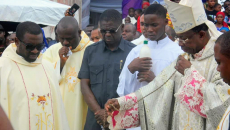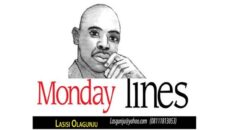By AKIN BANJOKO
As a writer of Nigerian descent living in the United States, US, whenever I attend writers’ conferences, workshops or book festivals, my American colleagues always ask me if I have read certain books about Nigeria. There are few I have read, but there are many I have not and this usually makes me feel uncomfortable. So for about two weeks this summer, amidst my busy schedule, I selected four of these books and devoured them as if my life depended on them.
The first is titled The Trouble With Nigeria, written by Chinua Achebe and published in 1983. The second is titled The Open Sore of A Continent – A Personal Narrative of The Nigerian Crisis, written by Wole Soyinka and published in 1996. The third, This House Has Fallen – Midnight In Nigeria, written by Karl Maier, an American journalist, published in 2000. And the fourth Nigeria – Dancing On The Brink, written by John Campbell, a former US ambassador to Nigeria. The updated edition was published in 2013.
Not only were these books written by erudite scholars and distinguished writers, they are detailed, well researched and brutally honest. Like Mortimer J. Alter once wrote “In the case of good books, the point is not how many you can get through but rather how many of them can get through to you”. There is no way any serious Nigerian, anywhere in the world, would read any of these books and not feel his stomach turn. This thus leads me to the thinking that, it’s either our leaders don’t read or they just don’t care. Lots of situation reports and warnings abound in these books such that had our leaders acted fast, we would not be in the terrible situation we are in today.
My challenge in this essay is how to distill these four books, totalling 864 pages into a one-page essay. I shall therefore use snippets from the books to illuminate my points. Speaking of patriotism, Achebe in his book wrote: “There is no doubt that Nigerians are among the world’s most unpatriotic people. But this is not because Nigerians are particularly evil or wicked. In fact they are not. Who is a patriot? He is a person who loves his country. He is not a person who says he loves his country. He is not even a person who shouts or swears or recites or sings his love for his country. He is one who cares deeply about the happiness and wellbeing of his country and its people.
Patriotism is an emotion of love directed by a critical intelligence. True patriotism is possible only when the people who rule and those under their power have a common and genuine goal of maintaining the dispensation under which the nation lives. This in turn will happen if the nation is ruled justly, if the welfare of all the people rather than the advantage of the few becomes the cornerstone of public policy”.
Achebe is right. Look at our so-called leaders acting like enemies invading a foreign nation and robbing her blind. Our youth have no jobs several years after graduating from the universities. Our poor and hungry wake up daily and curse the nation. That is why that in Nigeria today, any calamity that befalls any of our leaders sets off a festival of schadenfreude among us. There is no empathy. We have become so baneful. How can patriotism thrive?
Soyinka in his book, amongst other topics, dealt with the issue of power and North-South dichotomy. He used the June 12, 1993 election, which Chief MKO Abiola won and was nullified, to demystify the northern monolithic theory and those who constitute the dangerous conspiratorial and reactionary clique minority, those who believe that they are divinely and pre-naturally chosen to rule Nigeria. He wrote: “The pattern of voting also made it abundantly clear to me and the entire world that the so-called gulf between the North and South was a deliberate invention of a minor, power-besotted leadership and its divisive gamesmanship. There is indeed a line of division in the North and South, but it is drawn between the workers, peasants, civil servants, petty traders, students and the unemployed on the one hand and the parasitic elite and feudal scions on the other”. But unfortunately today, we are back to the old game. Some of these feudal lords are now threatening death and blood if they would not rule Nigeria.
Campbell wondered in his book why Nigeria as rich as she is, cannot take care of her citizens, but because of corruption. He wrote: “Nigeria is hobbled by itself and by its history, not by present-day external actors including al-Qaeda affiliates. Though the international community would pay a steep price for Nigerian state failure and the likely humanitarian calamity, it can do little except at the margin to prevent it. Nigeria is too big, the issues are too complex, and the international community is too distracted by seemingly more urgent matters”. His conclusion? Only Nigerians can save Nigeria.
Maier in his book dealt with the crisis points in Nigeria. He however pointed out the three options staring us in the face. He wrote: “Nigeria stands at a crossroads with three probable scenarios in front of it, two of which would produce severe consequences. The most productive scenario would demand Herculean efforts by the current administration to throttle corruption and mismanagement; strengthen the judiciary and the parliament and revive the economy. On the political front, the government should initiate a constitutional conference to allow a wide range of representatives from ethnic, religious, labour, women’s political and business groups to decide how they want to live. The results should then be put to a nationwide referendum, which might create enough space for Nigerians to start talking and listening to one another. And ultimately to fashion out a political and economic order in which they feel they have a true stake”.
“Should such an attempt at national dialogue be stymied, a second scenario would see the perpetuation of the status quo, with a civilian government lurching from crisis to crisis, the economy remaining gripped by stagnation, and the legitimacy of the state in constant question. Nigeria would continue to bleed away its abundant natural and human resources, living standards would spiral ever downwards, sporadic religious and ethnic clashes would claim more lives, and the remnants of the professional class would follow millions of their country men and women to positions abroad. In the third scenario, one of disaster, the civilian administration would fail to deal with Nigeria’s myriad social and economic problems opening door to a return of military dictatorship. That could spark an outbreak of ethnic and regional violence not seen since the Biafran civil war and possibly lead to the breakup of the country”. Imagine, this is a book published in 2000.
Our leaders seem to be overlooking leprosy and concentrating on curing ringworm. In their effort to save the image of the country, they label anybody that confronts them with the stark realities of the day as enemy of Nigeria. We need to act Now!
Follow Us on Social Media

 WhatsApp us
WhatsApp us